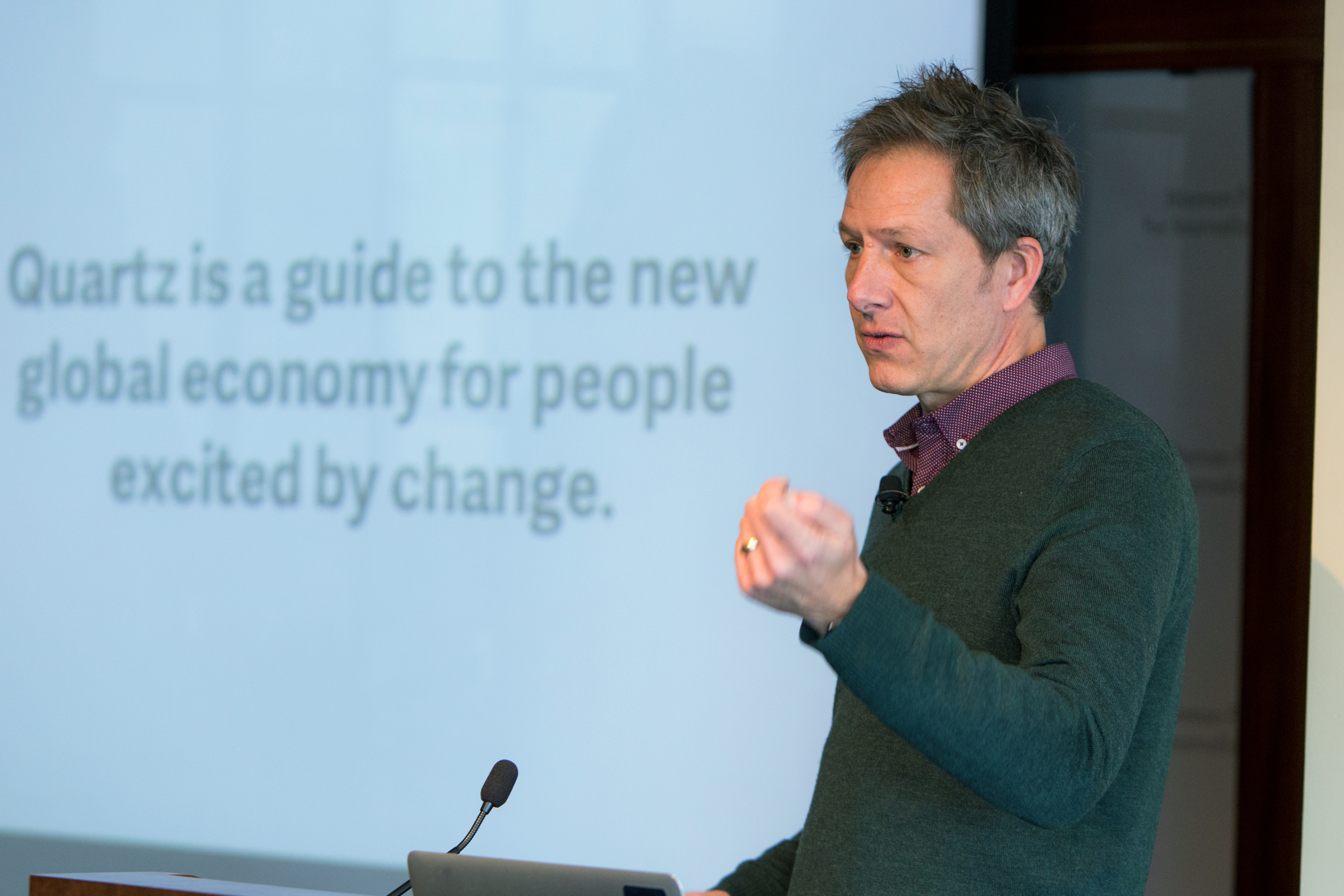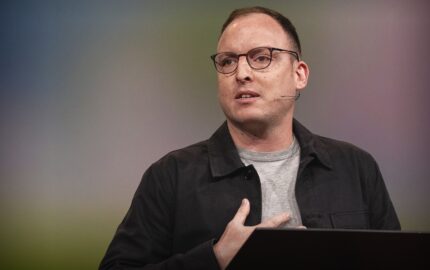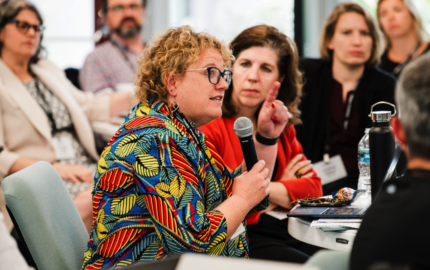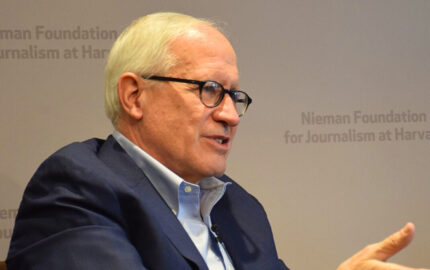After a stint as advertising director and publisher of Wired magazine, Jay Lauf became vice president and publisher of The Atlantic in 2008. Four years later, he moved over to Quartz, which is owned by Atlantic Media, The Atlantic’s parent company. Quartz, which shares human resources, legal, and IT departments with Atlantic Media, now has about 235 employees.
Quartz, a guide for businesspeople to the new global economy, is notable for its success making money through advertising. Every ad on Quartz is custom-made and is many times the cost of a typical banner ad. The site boasts a 90 percent renewal rate from its advertisers.
In the early days, LinkedIn was a major driver of traffic to Quartz. For the past couple years Facebook was the biggest source of traffic. Today Google is the number one source. “Mercifully and luckily for us, we’ve never over-optimized for a single platform,” Lauf says.
During a talk at the Nieman Foundation in February, Lauf discussed the site and things to keep in mind when launching an online media outlet. Edited excerpts:
What is your site’s natural tone? I’ve seen legacy brands try to mimic what we do, and it isn’t authentic, it’s not resonant. Figure out what your own unique tone is. If it’s earnestness and straightforward and direct, then start out by going with that.
Put yourself in the shoes of who your target reader is, and think, “What do you want from me? What is it that I can do to add value to that time in the morning?” Strip everything else out of it.
For us with the Daily Brief, we’ll quickly tell you the important stuff that happened in the global economy while you were sleeping. The first half of our Daily Brief is fairly straight and earnest. Here’s some business news you need to know. What we segue into is what we call Surprising Discoveries and Matters of Debate. What we’ll do is surface debates that are happening in other media around a topic. Pick a topic that people feel passionate about and maybe say, “Hey, here’s one argument that might either piss you off, or you might be interested in reading.”
Surprising Discoveries is things you didn’t know you didn’t know. I think you could do constructs like that where tone matters less than whether you are surfacing stuff that’s interesting and relevant to your audience.
I would do the thought experiment: If all you were was an email newsletter and everything else you owned is gone, what would you make that email newsletter? That’s what we did.
I want to see the subscriber numbers go up, but more important than that, look at active monthly users. How many of those people who have signed up are still active and continuing to open your newsletter? The Daily Brief has got a 40 percent open rate, which is way above the industry average. That means we’re doing something right. We don’t care really that much about clickthrough back to the site. That’s not what that email is designed to do.
In starting an online business, I probably would think today about starting with some sort of subscription product to build that habit from the beginning. One of the reasons we didn’t do that for Quartz is that was a disadvantage that our competitors had. They were suppressing traffic on the social web because every time you run into a paywall or some restriction, you’re more likely to leave.
Everyone needs to think about diversifying revenue streams. You don’t want to be too dependent on any one stream, if you can avoid it.
We think that audio is going to be an important part of the future in a lot of different ways. We experimented with a podcast a few years ago. We didn’t get a big audience. I don’t think it was quite sharp enough thematically to be something that would catch on. We moved on from that but it doesn’t mean that we won’t get back into it.
The other audio thing that we’ve jumped into and find really interesting is being on the Echo platform. We have a morning briefing that I listen to while I’m shaving every morning. We’re experimenting and tinkering with that. We embed sound into some of the articles. We think audio is an interesting and important format for spreading the journalism. What’s less clear to me on these new platforms thus far is meaningful monetization.
It’s first a cultural question. Quartz itself was an experiment. We went into it with that culture. If I were in a bigger institution, I would do the classic, “We’re going to slice out X percent of time, money, a slice of what we do.” Be deliberate about it and say “for experimentation,” and set the ground rules from the top that it’s okay if we fail.
The critical piece is before you launch the experiment, ask what are the metrics of success. Fairly quickly into it, you can see, say, that it’s not hitting these metrics. You can reserve the right to change them.
By X mark, we’re going to pull up and say, “Is this working or not?” It allows you to do that unsentimentally. But listen, even in our shop, the people who work on this stuff or greenlight it, myself included, are reluctant to say it didn’t work.
For Quartz, you’re seeing a degree of going deep in the obsessions area where I think we can verticalize more. We launched this thing called Quartz at Work. That was born out of an obsession a lot of our editors and writers had around current best practices for managing a company, managing a career, thinking about distributed workforces, etc. We’ve got a Facebook group Quartz at Work, which is engaging this community of people who really want to share and understand best practices.
If the first five years was about opening the top of the funnel to invite as many people as we can around the world in our target audience to understand, know, and engage with Quartz, you’re going to see us try to engage those people much more deeply to unlock additional business opportunities.
Quartz, a guide for businesspeople to the new global economy, is notable for its success making money through advertising. Every ad on Quartz is custom-made and is many times the cost of a typical banner ad. The site boasts a 90 percent renewal rate from its advertisers.
In the early days, LinkedIn was a major driver of traffic to Quartz. For the past couple years Facebook was the biggest source of traffic. Today Google is the number one source. “Mercifully and luckily for us, we’ve never over-optimized for a single platform,” Lauf says.
During a talk at the Nieman Foundation in February, Lauf discussed the site and things to keep in mind when launching an online media outlet. Edited excerpts:
On finding the right approach for your newsletter
What is your site’s natural tone? I’ve seen legacy brands try to mimic what we do, and it isn’t authentic, it’s not resonant. Figure out what your own unique tone is. If it’s earnestness and straightforward and direct, then start out by going with that.
Put yourself in the shoes of who your target reader is, and think, “What do you want from me? What is it that I can do to add value to that time in the morning?” Strip everything else out of it.
For us with the Daily Brief, we’ll quickly tell you the important stuff that happened in the global economy while you were sleeping. The first half of our Daily Brief is fairly straight and earnest. Here’s some business news you need to know. What we segue into is what we call Surprising Discoveries and Matters of Debate. What we’ll do is surface debates that are happening in other media around a topic. Pick a topic that people feel passionate about and maybe say, “Hey, here’s one argument that might either piss you off, or you might be interested in reading.”
Surprising Discoveries is things you didn’t know you didn’t know. I think you could do constructs like that where tone matters less than whether you are surfacing stuff that’s interesting and relevant to your audience.
I would do the thought experiment: If all you were was an email newsletter and everything else you owned is gone, what would you make that email newsletter? That’s what we did.
On measuring success
I want to see the subscriber numbers go up, but more important than that, look at active monthly users. How many of those people who have signed up are still active and continuing to open your newsletter? The Daily Brief has got a 40 percent open rate, which is way above the industry average. That means we’re doing something right. We don’t care really that much about clickthrough back to the site. That’s not what that email is designed to do.
On the value of paid subscriptions
In starting an online business, I probably would think today about starting with some sort of subscription product to build that habit from the beginning. One of the reasons we didn’t do that for Quartz is that was a disadvantage that our competitors had. They were suppressing traffic on the social web because every time you run into a paywall or some restriction, you’re more likely to leave.
Everyone needs to think about diversifying revenue streams. You don’t want to be too dependent on any one stream, if you can avoid it.
On the potential of audio
We think that audio is going to be an important part of the future in a lot of different ways. We experimented with a podcast a few years ago. We didn’t get a big audience. I don’t think it was quite sharp enough thematically to be something that would catch on. We moved on from that but it doesn’t mean that we won’t get back into it.
The other audio thing that we’ve jumped into and find really interesting is being on the Echo platform. We have a morning briefing that I listen to while I’m shaving every morning. We’re experimenting and tinkering with that. We embed sound into some of the articles. We think audio is an interesting and important format for spreading the journalism. What’s less clear to me on these new platforms thus far is meaningful monetization.
On being okay with failing
It’s first a cultural question. Quartz itself was an experiment. We went into it with that culture. If I were in a bigger institution, I would do the classic, “We’re going to slice out X percent of time, money, a slice of what we do.” Be deliberate about it and say “for experimentation,” and set the ground rules from the top that it’s okay if we fail.
The critical piece is before you launch the experiment, ask what are the metrics of success. Fairly quickly into it, you can see, say, that it’s not hitting these metrics. You can reserve the right to change them.
By X mark, we’re going to pull up and say, “Is this working or not?” It allows you to do that unsentimentally. But listen, even in our shop, the people who work on this stuff or greenlight it, myself included, are reluctant to say it didn’t work.
On future directions
For Quartz, you’re seeing a degree of going deep in the obsessions area where I think we can verticalize more. We launched this thing called Quartz at Work. That was born out of an obsession a lot of our editors and writers had around current best practices for managing a company, managing a career, thinking about distributed workforces, etc. We’ve got a Facebook group Quartz at Work, which is engaging this community of people who really want to share and understand best practices.
If the first five years was about opening the top of the funnel to invite as many people as we can around the world in our target audience to understand, know, and engage with Quartz, you’re going to see us try to engage those people much more deeply to unlock additional business opportunities.



